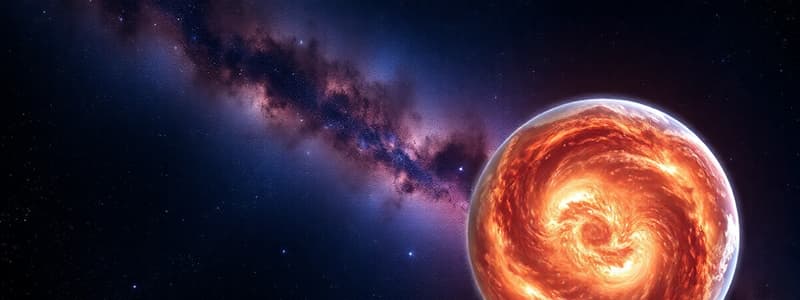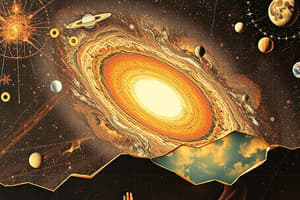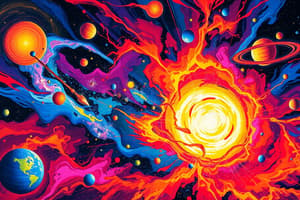Podcast
Questions and Answers
What phenomenon suggests that certain regions of space were once in thermal equilibrium?
What phenomenon suggests that certain regions of space were once in thermal equilibrium?
- Cosmic inflation
- Big Bang nucleosynthesis
- Cosmic microwave background radiation (correct)
- Steady State Theory
Which theory provides a natural explanation for the rapid expansion of the universe shortly after the Big Bang?
Which theory provides a natural explanation for the rapid expansion of the universe shortly after the Big Bang?
- Cosmic Inflation Theory (correct)
- Dark Energy Theory
- Steady State Theory
- Quantum Fluctuation Theory
How does the multiverse theory differ from the concept of a parallel universe?
How does the multiverse theory differ from the concept of a parallel universe?
- Multiverse is based on quantum mechanics, whereas parallel universes are based on classical physics.
- Multiverse consists of bubbles, while parallel universes are copies of the same universe.
- Multiverse theory proposes multiple isolated universes, while parallel universes exist simultaneously in the same space. (correct)
- Multiverse includes an infinite number of dimensions, while parallel universes are confined to one space.
What is one of the primary effects of gravity in the early universe?
What is one of the primary effects of gravity in the early universe?
What assumption is essential in the inflation theory regarding the state of the universe after the Big Bang?
What assumption is essential in the inflation theory regarding the state of the universe after the Big Bang?
What characterizes the oscillating universe model?
What characterizes the oscillating universe model?
Which of the following concepts is referred to as an alternate reality that exists in parallel to our universe?
Which of the following concepts is referred to as an alternate reality that exists in parallel to our universe?
According to the Steady State Theory, how is the universe described?
According to the Steady State Theory, how is the universe described?
What does the flatness problem suggest about the universe's density?
What does the flatness problem suggest about the universe's density?
What is a magnetic monopole according to certain grand unified theories?
What is a magnetic monopole according to certain grand unified theories?
What major problem does the Steady State Theory face?
What major problem does the Steady State Theory face?
What does an open universe imply regarding its density compared to critical density?
What does an open universe imply regarding its density compared to critical density?
What is the significance of curvature in the context of the universe's expansion?
What is the significance of curvature in the context of the universe's expansion?
Which statement accurately describes the Big Bang Theory?
Which statement accurately describes the Big Bang Theory?
Which fundamental force is responsible for the stability of atomic nuclei?
Which fundamental force is responsible for the stability of atomic nuclei?
What is the primary difference between the geocentric model and the heliocentric model proposed by Nicolaus Copernicus?
What is the primary difference between the geocentric model and the heliocentric model proposed by Nicolaus Copernicus?
During which process does the Weak Force play a critical role?
During which process does the Weak Force play a critical role?
What role does the Electromagnetic Force play in the universe?
What role does the Electromagnetic Force play in the universe?
What is true about Gravitational Force in the context of the universe?
What is true about Gravitational Force in the context of the universe?
Which of the following statements best defines cosmology?
Which of the following statements best defines cosmology?
Which force is associated with beta decay in atomic physics?
Which force is associated with beta decay in atomic physics?
What phenomenon does nuclear fusion in stars primarily rely on?
What phenomenon does nuclear fusion in stars primarily rely on?
What is the main concept described in the Rigveda concerning the universe?
What is the main concept described in the Rigveda concerning the universe?
Which narrative describes the creation of the universe in six days?
Which narrative describes the creation of the universe in six days?
What belief is attributed to Leucippus and Democritus regarding the universe?
What belief is attributed to Leucippus and Democritus regarding the universe?
Which of the following terms refers specifically to scientists who study the universe?
Which of the following terms refers specifically to scientists who study the universe?
What role does the concept of 'Bindu' play in the understanding of the universe according to the Rigveda?
What role does the concept of 'Bindu' play in the understanding of the universe according to the Rigveda?
How were creation myths traditionally communicated across generations?
How were creation myths traditionally communicated across generations?
What did the early theories about the universe, such as those by Leucippus and Democritus, emphasize?
What did the early theories about the universe, such as those by Leucippus and Democritus, emphasize?
Flashcards are hidden until you start studying
Study Notes
Learning Objectives
- Understand the historical development of universe origin theories.
- Identify components of the universe.
Main Concept
- Initially, only pure energy existed; matter did not exist.
Definitions
- Cosmology: Study of the universe's origin, properties, processes, and evolution.
- Astronomy: Scientific study of celestial objects and space.
- Astronomers: Scientists dedicated to studying the universe.
Theories of the Origin of the Universe
Creation Myths
- Symbolic narratives passed through generations via oral traditions.
- Hebrew Bible/Christian Old Testament: Describes God's creation over six days.
- Rigveda: Hindu text explaining the universe's oscillation from a "cosmic egg."
- Leucippus and Democritus: Proposed an atomic universe with indivisible atoms.
- Aristotle and Ptolemy: Introduced geocentric model; Earth as the center of the universe.
- Nicolaus Copernicus: Demonstrated celestial motion without a geocentric framework.
Big Bang Theory
- Universe began with a massive explosion from a "singularity."
- Four Fundamental Forces:
- Strong Force: Binds protons and neutrons; essential for nuclear processes in stars.
- Electromagnetic Force: Governs interactions between charged particles; crucial for matter formation and light transmission.
- Weak Force: Catalyzes radioactive decay; important for stellar nucleosynthesis.
- Gravitational Force: Attracts masses; responsible for the structure of galaxies and solar systems.
Oscillating Universe
- Universe experiences cycles of expansion and contraction, leading to a "Big Bang" and a "Big Crunch."
Steady State Theory
- Suggests constant density of the universe with continuous matter creation.
- Proposes the universe is unchanging over time.
Evidences and Problems
- Flatness Problem: Current density of the universe is nearly critical, indicating a flat geometry.
- Monopole Problem: Absence of magnetic monopoles challenges the Steady State Theory.
- Horizon Problem: Uniformity of cosmic microwave background (CMB) contradicts the Steady State Theory.
Inflation Theory
- Postulates rapid expansion shortly after the Big Bang, leading to our current universe's structure.
Multiverse vs. Parallel Universe
- Multiverse: Suggests existence of multiple universe "bubbles".
- Parallel Universe: Refers to alternate realities coexisting alongside our universe.
Studying That Suits You
Use AI to generate personalized quizzes and flashcards to suit your learning preferences.




